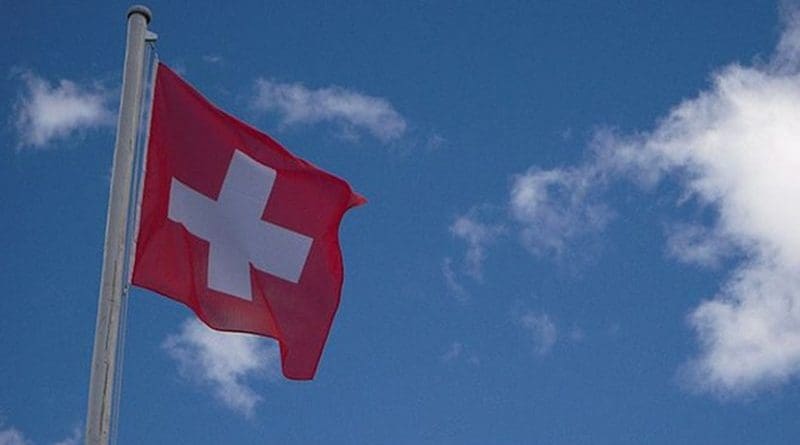Switzerland’s Controversial Lucrative Business Of Arms Deals
By SwissInfo
While much of the economy is still reeling from the pandemic, the Swiss arms industry has posted record exports figures. Yet it often deals with disreputable business partners. Parliament, now facing the threat of a people’s initiative, is seeking to tighten the screws on weapon exporters.
By Katy Romy and Pauline Turuban
Swiss weaponry will be protecting the upcoming 2022 World Cup hosted in Qatar. The Gulf State has purchased two air-defence systems worth CHF200 million ($216.6 million) from a Zurich arms company, the Swiss German-language daily Blick reported in early June. This is one of the biggest Swiss arms deals in recent years.
However, behind the glistening new infrastructure that will host football’s crowning event lies the grim reality of a country that systematically violates human rights. Since Qatar was awarded the World Cup ten years ago, some 6,500 migrant workers have lost their lives, many of them on building sites, according to an investigation by the British daily the Guardian.
The scandal did not prevent the Swiss government from approving the weapons deal. According to the law, arms exports are allowed even to countries that commit serious human rights violations. Moreover, Qatar pulled out of the military alliance in Yemen in 2017 and is therefore no longer involved in a conflict.
In contrast, after the revelation, a Danish company refused to supply the grass for the stadiums, and many of the players, usually not politicised, raised their voices in protest.
Police violence with Swiss weapons in Brazil
This is not the first time that Swiss munitions have fallen into the hands of people that don’t respect human rights. Swiss pistols, rifles, armoured vehicles and helicopters are used in Brazilian police and military operations in which human rights are regularly violated, according to a study by Terre des Hommes.
The children’s aid organization Terre des Hommes Switzerland, its German counterpart and the Brazilian Instituto Sou da Paz have called for a stop to Swiss arms exports to Brazil. The country is the eighth largest customer of the Swiss arms industry, with exports amounting to over CHF30 million in 2020.
“Police violence has reached a dramatic scale. Four children and young people die every day in Brazil at the hands of the police and military,” the report charges.
The flexibility of the export criteria explains the presence of Swiss weapons in such countries. In recent years, the government has gradually relaxed its War Material Regulation. In 2014, it authorised exports to countries which “systematically and seriously violate human rights,” as long as the risk remains low that “the war material exported will be used to commit serious violations of these rights.”
In 2016, the War Material Regulation was reinterpreted. The ban on weapon exports to countries involved in conflict now only applies if the conflict is taking place directly in the importing country.
These changes have given arms manufacturers considerable room for manoeuvre. They are “rather favourable” to the economy, according to a 2018 report by the Federal Audit Office. Figures confirm this: the total volume of Swiss arms exports has grown steadily since 2016.
In 2020, Switzerland exported over CHF900 million worth of war material – an all-time record.
Scandals break out
A series of scandals, however, has drawn attention to the flip side of the coin. In 2018, footage of Swiss weapons being used by militias in Syria, Libya and Yemen sparked outrage. That same year, the cabinet announced plans to authorize exports to countries in civil war, as long as there were no grounds to believe that the weapons would be used in that conflict.
In 2019, a coalition of left-wing and right-wing politicians and civil society organizations launched an initiative “against arms exports to countries in civil war”. The text does not call for a complete ban on weapon exports, but seeks to prevent arms from being sold to States that seriously violate human rights, as was the case before 2014.
‘A step in the right direction’
On June 3, the promoters of the initiative won their first victory. Parliament’s upper house, the Senate, accepted the government’s counter-proposal to the initiative. This includes a ban on arms exports to countries that commit serious human rights violations, and removes provisions whereby the cabinet could approve exceptions to the rule. This would, for instance, make it difficult to export munitions to Qatar, as was done in connection with the Football World Cup.
“This is a strong commitment to Switzerland’s humanitarian tradition and an important contribution to a credible peace policy,” the coalition wrote in a statement. If parliament’s lower house also supports the counter-proposal as it stands, the coalition is considering withdrawing its initiative.
Terre des Hommes Switzerland, a member of the coalition, welcomes the Senate’s decision. “It’s a step in the right direction. With this move, exports to countries that violate human rights will no longer be possible,” says Andrea Zellhuber, an expert in violence prevention at the NGO.
The House of Representatives has yet to validate the proposal.
(Adapted by Julia Bassam; edited by Virginie Mangin)

